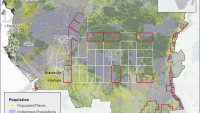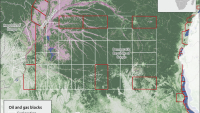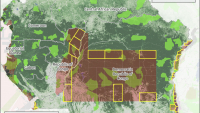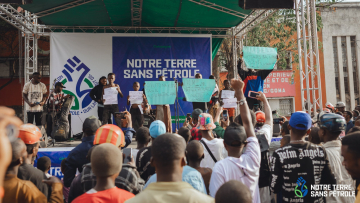
Project – Active
This profile is actively maintainedBankTrack, 350.org Africa, Greenpeace Africa & Rainforest Foundation UK
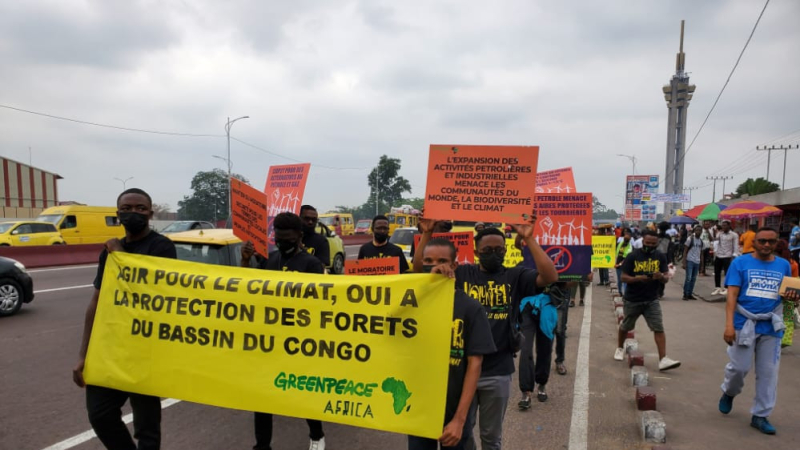
Project – Active
This profile is actively maintainedBankTrack, 350.org Africa, Greenpeace Africa & Rainforest Foundation UK
Why this profile?
The Congolese government has launched calls for tenders on 30 oil and gas blocks located in the Congo Basin. This region hosts protected areas and peatlands, and fossil fuel extraction in the area risks leading to environmental destruction, displacement of local people and loss of traditional livelihoods. In addition, fossil fuel exploitation in peatlands causes a vicious cycle, simultaneously removing one of the world’s most important carbon sinks while drastically increasing emissions.
What must happen
Financial institutions should avoid supporting companies involved in bidding for or developing these oil and gas blocks, either through direct project financing or general corporate finance. Financial institutions should also ensure they have policies in place restricting finance to any company that participates in oil and gas auctions, especially in protected areas.
| Sectors | Oil and Gas Extraction |
| Location |
|
| Status |
Planning
Design
Agreement
Construction
Operation
Closure
Decommission
|
In January 2021, former Minister of Hydrocarbons Rubens Mikindo announced his intention to open 19 new oil blocks to bidding from fossil fuel companies. In April 2022, a new minister, Didier Budimbu Ntubuanga proposed 16 oil blocks to the council of ministers for approval. However, three months later, the DRC began accepting bids for exploration in 30 oil and gas blocks, introducing 14 additional blocks that were not put before the council of ministers. The blocks are spread across the country throughout three sedimentary basins, including the coast, central Congo, and the Tanganyika rift valley. Minister Ntubuanga promised that all protected areas will be spared, but according to an analysis by Greenpeace, 13 blocks lie in protected areas.
The region of the Congo Basin, where all gas and oil blocks are located, represents 70% of Africa’s forested land and 75 million people from over 150 ethnic groups depend for their livelihoods on the health of this rainforest. It is also a biodiversity hotspot and a habitat for more primates than any other place worldwide, including great apes such as gorillas, chimpanzees, and bonobos.
In October 2024 the Congolese hydrocarbons ministry cancelled the auction of the 27 oil blocks (but not of the three gas blocks), but said it plans to relaunch the auction soon.
Impact on human rights and communities
Land grabbing & local opposition
Much of the forest land throughout the DRC is inhabited by local communities, which have customary rights to the land. Congolese law states that these people must at the least be consulted, and Indigenous communities have the right to Free, Prior and Informed Consent to developments affecting their lands. The exploitation of oil – given the large intersection between the oil blocks and these people’s land – is a serious threat to the communities.
Greenpeace conducted four field trips to six designated oil blocks, interviewing members of the local community near the land put up for auction. Neither the government nor extractive companies have consulted these communities – despite trading leases to their land. Greenpeace has reported on the opposition expressed by the communities to the project and their anger at being excluded from the discussion. Some of these communities have no phone network or radio coverage and only a few narrow tracks for motorbikes lead to them: they learnt about the auction on their lands only from Greenpeace activists. The lack of these basic infrastructures also raises questions over how realistic oil exploration in this remote region is.
With regard to the gas blocks, while gas extraction has not yet begun in the DRC side of Lake Kivu, it has in Rwanda. Communities living by power plants on the Rwandan side of Lake Kivu reported few changes in their economic prospects or access to energy. The population near the lake have already expressed concerns regarding the environmental impacts of methane gas extraction, such as groundwater and surface water contamination as well as the destruction of aquatic life.
Health and Livelihoods
Populations across the oil and gas blocks largely rely on fishing, subsistence agriculture and livestock. Fossil fuel extraction represents a threat to these livelihoods, with the potential to poison the rivers and land upon which the communities depend.
While no activities have started yet in the new oil blocks, the DRC is able to draw lessons from its experience with the oil giant Perenco. Two French NGOs took Perenco, which currently operates 11 other fields across the country, to court, suing the company over more than 150 separate instances of serious pollution, including methane releases, oil leaks, and the burying of toxic sludge. The University of Lubumbashi’s toxicology department released a 2020 study in which researchers tracked alarming rates of respiratory and digestive illnesses, as well as benzene contamination, in communities near drill sites.
Broader research suggests that contaminated crops are stunted and the food they produce is depleted, lacking nutrients. Pollutants from crude oil can cause heart disease, mental disorders, severe allergies, and respiratory issues, particularly among the young and old. Dust particles from drilling, too, may cause illness among local communities.
Despite Congo’s legal framework governing the disposal of waste, the lack of practical oversight has allowed Perenco to pollute at will. Many of the new oil blocks slated for development are in far more remote, logistically challenging and ecologically sensitive areas than Perenco’s fields. It’s likely that future fossil fuel exploitation will lead to serious health impacts on the local population – especially given that the government and fossil fuel companies already circumvented the law during the auction award process.
Impact on climate
Any new fossil fuel project is out of line with the International Energy Agency’s roadmap for keeping global temperature rises under 1.5° Celsius. Under its Nationally Determined Contribution (NDC) for mitigating climate change, the DRC committed to reducing greenhouse gas emissions by almost 20 percent over the next decade. Yet the blocks put up for auction could contain as much as 16 billion barrels of oil. Given that one barrel of oil is equivalent to 0.43 tonnes of CO2 emissions, the Congolese oil reserves have the potential to release almost 7 billion tonnes of CO2 into the atmosphere.
Fossil fuel exploitation in peatlands causes a vicious cycle, simultaneously removing one of the world’s most important carbon sinks while drastically increasing emissions. DR Congo’s peatlands store about 30 gigatons of carbon, equivalent to three years of global carbon pollution. Research suggests these areas are vulnerable to climate change and may emit carbon as increased heat causes them to dry out. The development of roads and pipelines, as well as exploratory drilling, only adds to this problem by potentially changing the peatlands’ drainage system. This, too, could cause peatlands to dry out and release their carbon stores.
Impact on nature and environment
Mismanagement of these projects – as has occurred at active Perenco sites – could cause oil spillage and improper waste disposal, spewing contaminated water into the environment. An oil spill reaching the rivers would threaten not only the biodiversity in these specific blocks, but also plants and animals in the protected areas that lie nearby. Oil pollution affects nutrient cycles in soil microbes, removing nitrogen from the soil and destabilising the ecosystem. Oil spills also destroy soil biodiversity, stunt the growth of fish, and poison waterfowl.
Moreover, these extractions will take place in the Congo Basin, the world’s second-largest forest basin, second only to the Amazon rainforest, and in the world’s largest tropical peatlands. At least 13 of the oil blocks up for auction overlap with protected areas. Fossil fuel exploration disturbs peatlands, as contaminants spread quickly and easily – dragged along by flowing water – and persist for years.
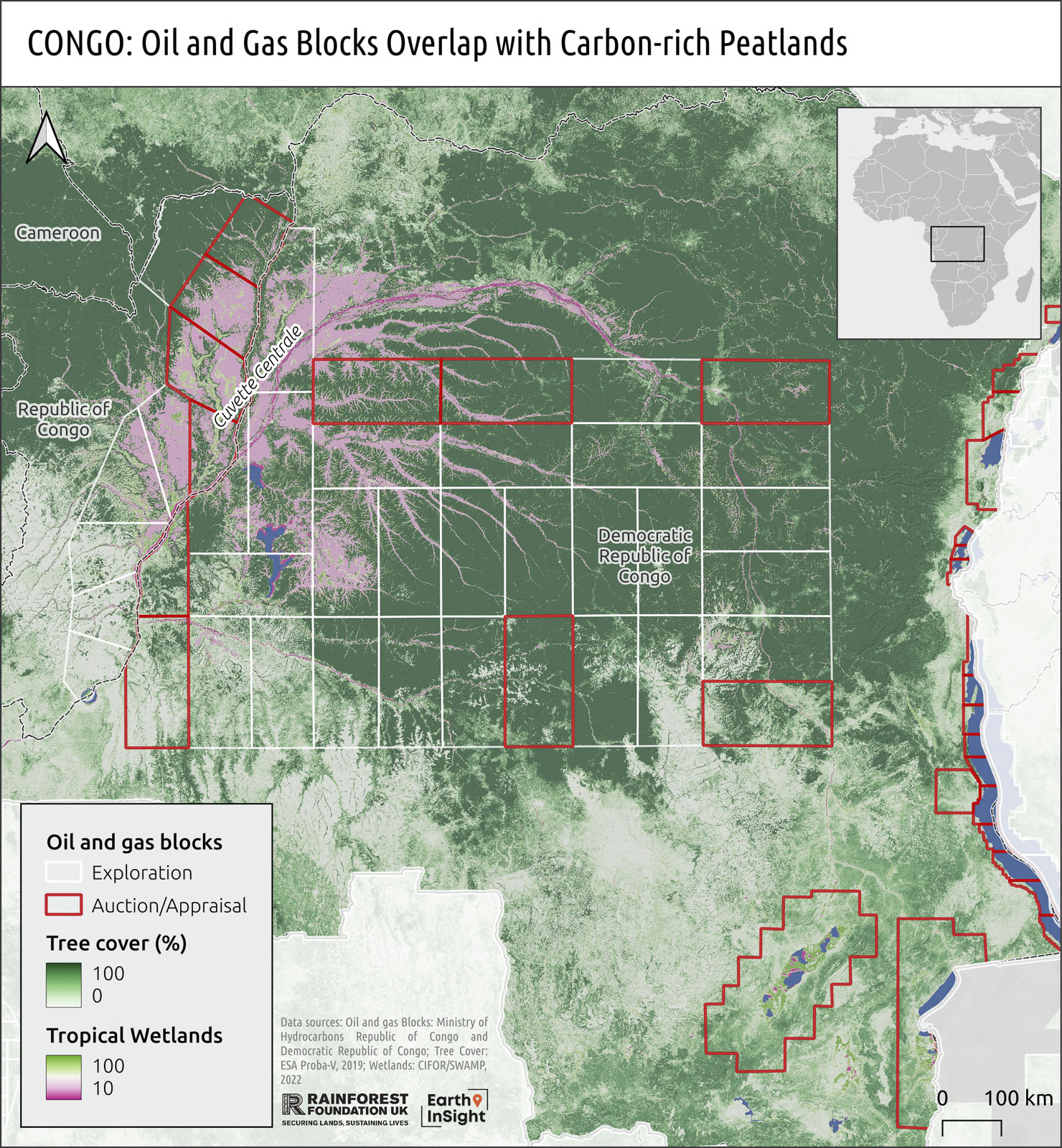
Gas exploitation at Lake Kivu runs the risk of gas eruptions, harmful algae blooms, and contamination of the water supply with “washing water” - the water used to clean raw gas at the power plant that contains hydrogen sulphide, which is toxic to fish and other animals.
In September 2023, DRC President Tshisekedi announced a plan to devote up to 30% of the country’s territory to the protection of biodiversity for 2030, promising to mobilise substantial funding for the planned efforts. Peatlands are among the ecosystems the DRC government aims to protect. To raise the necessary funds, the President has called on the international community to develop carbon markets in Africa. It is unclear whether this new proposition by the DRC President means that the government will withdraw the oil blocks that directly affect peatlands from the auction.
The extraction of oil in these remote areas, where basic infrastructures are lacking, would require the construction of hundreds of miles of pipelines through dense tropical rainforest, adding new sources of emissions and furthering the destruction of the natural environment.
Other impacts
Legal concerns
The government’s legal authority to authorize the sale of these oil and gas blocks appears uncertain. Nearly half of the blocks were put up for auction without the appropriate legal procedure, which requires consulting the council of ministers. When pressed, the minister said it was “inadvertent” that blocks were put up for bidding without an official confirmation. Minister Ntubuanga also lied during his interview on TV5Monde, saying that none of the blocks lie in protected areas. In fact, 13 protected areas overlap with these blocks, including Virunga National Park, a UNECO World Heritage site.
Corruption
The DRC suffers from high rates of corruption, raising concerns about this project. To drill for oil in the DRC, companies must pass through the Congolese Ministry of Hydrocarbons, a process which, some researchers claim, requires paying millions of dollars to arrange meetings and acquire important data.
While Minister Budimbu has claimed otherwise, the auction process has been far from transparent so far. Two oil blocks were reportedly reserved for the firm Clayhall Group, an online betting tycoon, in exchange for the pre-financing of geological surveys. In a letter addressed to the Minister last year, Clayhall’s CEO Chukwuma Ojuroye stressed the “necessity and urgency” of proceeding with a separate, restricted tender to concretize the deal. The Minister failed to mention this deal in any of his numerous press conferences, media interviews or tweets and only updated the Council of Ministers on the pre-financing agreement, without mentioning the clause reserving oil blocks for Clayhall.
Moreover, at least two of the companies involved in the Lake Kivu exploitation, Alfajiri Energy and Winds Exploration and Production LLC, have no infrastructure in place and no experience in gas extraction in Congo or elsewhere in Africa. Alfajiri Energy was just founded in January 2022 and Wind Exploration and Production currently only operates one gas field in Utah, United States.
Alfajiri’s win raised suspicions of corruption when, in December 2022, a leaked report from the DRC’s Ministry of Hydrocarbons detailed how the company’s bid did not meet the minimum financial requirements. Investigative journalists found that Minister for Hydrocarbons Budimbu pressured its staff to manipulate the auction in Alfajiri’s favour. Alfajiri being, at the time of bidding, a two-month old start-up run from a Canadian private home also raises questions on its capability to conduct this technically complex project. Symbion Energy, which tried to start a gas extraction project on the Rwandan side of Lake Kivu, failed to raise enough funds and sold its lease to a new company, which has not yet been able to build a power plant.
In July 2023, Minister Budimbu was photographed receiving four Toyota Land Cruisers donated by French-British oil company Perenco. At the time, Perenco was a bidder for two oil blocks. Since then, the DCR government announced that Perenco had passed the first stage of the auction. Perenco already operates in the DRC. It is the sole oil operator so far present in the DRC. It has been accused of causing serious environmental damages during its oil operations, for which it was sued in France in 2022.
Perenco is a notoriously opaque company.It is not listed on the stock market and therefore not subject to the transparency requirements a public listing demands. It also employs less than 10.000 individuals worldwide which absolves the company of having to disclose the risks associated with its operations abroad as required from large corporations under French law. A Perenco subsidiary is under investigation in Norway for ties to a corruption scandal in the neighbouring Republic of the Congo. In June 2023, grave instances of pollution at Perenco sites in Gabon were made public.
To date there is no information available on the financial institutions that will support the development of these oil and gas blocks.
Three North American companies won their bids to exploit natural gas in Congo’s Lake Kivu. Two companies are American - Symbion Power (acting through a local subsidiary called RED), and Winds Exploration and Production LLC - while the other, Alfajiri Energy, is based in Canada. Winds Exploration claims to be partnered with BP; the other two have no public affiliations. The auction for the oil blocks has not yet been completed.
Congo: oil and gas exploration and auction blocks and conservation areas (EarthInsight)
2024
2024-10-18 00:00:00 | Auction of 27 oil blocks cancelled
In October, the Congolese Ministry of Hydrocarbons cancelled the auction of 27 oil and gas blocks, citing issues "including late submissions, inappropriate or irregular offers, and a lack of competition" (Reuters). Greenpeace Africa welcomed the move as "a crucial advancement for environmental protection and climate justice throughout Africa", although they express concerns that the reprieve may be short-lived, as the Ministry of Hydrocarbons has hinted in a press release that it plans to resume the process “without delay”.
“This decision marks a significant victory, albeit temporary, stemming from the courageous advocacy efforts spearheaded by Greenpeace Africa since 2022 against this initiative. We call on the Congolese government to focus on investing in and promoting renewable energy sources instead of initiating a new bidding process for oil blocks, which would only recreate the same climate of uncertainty that has plagued the country for the past two years,” states Bonaventure Bondo, Forest Campaigner for the Congo Basin at Greenpeace Africa.
French newspaper Le Monde reported that "the declassification of the northern part of the Virunga National Park, a UNESCO World Heritage Site, is still being considered." and quoted the DRC's Minister of Hydrocarbons as saying that he will soon be going to Uganda to negotiate a connection to the EACOP oil pipeline.
2023
2023-11-14 00:00:00 | New companies show interest in oil auction
Australian company Conjugate Energy and Canadian company Triple 555, small oil companies, announced their interest in the auction of two oil blocks on Lake Albert. Two state-owned companies, Sonahydroc and Cobil also announced their bids.
2023-11-01 00:00:00 | Bidding deadline for four oil blocks postponed
The DRC Ministry for Hydrocarbons announces that the cut-off date for the auction of the four Albertine Graben oil blocks is postponed to April - May 2024.
2023-05-23 00:00:00 | French-British oil major Perenco expresses interest in the oil auction
Perenco files expressions of interest for the Nganzi and Yema II oil blocks.
2023-05-08 00:00:00 | Two companies show interest for the Matamba-Makanzi II oil block
The Ministry of Hydrocarbons official Twitter/X account announces that two companies, Kebo Energy SA and Century Energy Services Ltd, are interested in bidding for the Matamba-Makanzi II oil block.
2023-03-01 00:00:00 | US firm bids to stop contested DR Congo oil auction
EQX Biome, a US investment firm specialised in carbon offset credits files a bid for the 27 oil blocks, proposing green investments in the Congo for USD 400 million in conservation projects. These projects would generate USD 6 billion in carbon credits over 20 years, the condition for receiving these investments is that the DRC government calls off drilling in all 27 blocks. Minister Budimbu had previously declared to be open to bids from carbon-credit groups.
2023-01-31 00:00:00 | Oil bidding period prolonged to October 2023
Only days before the deadline for the auction of the oil concessions, DRC hydrocarbons minister Didier Budimbo announces via his Twitter/X account that the cut-off dates are postponed to April-October 2023.
2023-01-16 00:00:00 | Gas blocks awarded to three North-American companies
In January 2023, the DRC awarded licenses to three North America-based companies to begin drilling in the natural gas blocks. The ministry will begin unveiling its chosen companies for the oil blocks in April, and will continue to release the names until October. The minister hopes to kick off production in 2024.


